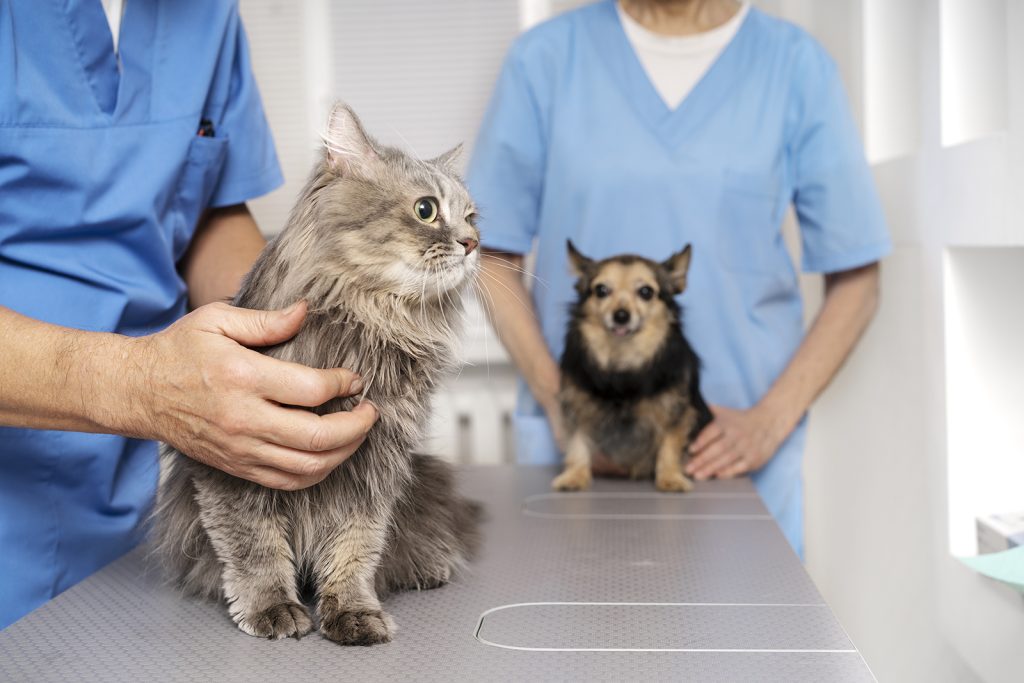Introduction:
As pet owners, ensuring our pets stay healthy is one of our top priorities. Regular veterinary checkups are essential for monitoring their health, preventing illness, and addressing any potential concerns before they become serious issues. However, many pet owners may not fully understand how often their pets should visit the vet, or what signs indicate that it’s time for a trip to the clinic.
In this article, we will discuss why regular veterinary checkups are vital for your pet’s health, how often they should be scheduled, and the signs that may indicate it’s time to seek veterinary care. By understanding the importance of regular checkups and knowing when to visit the vet, you can help ensure that your pet lives a long, healthy life.
1. Why Are Regular Veterinary Checkups Important for Pets?
Just like humans, pets need regular health assessments to catch potential health issues early, prevent diseases, and maintain overall well-being. Even if your pet appears to be in good health, regular veterinary visits provide the opportunity to detect underlying conditions that might not be immediately apparent.
a. Early Detection of Health Issues
Many health problems in pets, especially those related to internal organs (e.g., kidneys, heart, or liver) or early signs of conditions like cancer or arthritis, may not show obvious symptoms at first. Regular checkups allow the veterinarian to perform routine exams and diagnostic tests that can catch these issues early, improving the chances of successful treatment.
b. Vaccinations and Parasite Prevention
Vaccinations are crucial for preventing contagious diseases, and routine checkups ensure that your pet is up-to-date on their vaccination schedule. Additionally, veterinarians can recommend parasite prevention (e.g., flea, tick, and heartworm treatment) during checkups to avoid infestations and the transmission of diseases.
c. Maintaining Dental Health
Dental disease is one of the most common health issues in pets, especially in dogs and cats. Regular visits to the vet allow for professional dental cleanings and assessments to prevent gingivitis, tooth decay, and other oral health problems that can lead to more serious systemic issues.
d. Dietary and Weight Management
Veterinary checkups provide an opportunity for the vet to assess your pet’s body condition and weight, giving you advice on portion control, food quality, and any necessary dietary changes. Maintaining an appropriate weight is important for overall health, as obesity can lead to various conditions, such as diabetes, arthritis, and heart disease.
e. Senior Pet Care
As pets age, they become more prone to developing chronic conditions such as arthritis, kidney disease, or diabetes. Regular veterinary visits for senior pets are crucial for monitoring these conditions and providing early intervention when needed.
2. How Often Should You Take Your Pet for a Checkup?
The frequency of veterinary checkups depends on several factors, including your pet’s age, breed, and health status. Here’s a general guide to how often you should bring your pet to the vet:
a. Puppies and Kittens
For puppies and kittens, veterinary visits should begin as early as 6-8 weeks of age. These visits are important for vaccinations, deworming, and overall health assessments. Your vet will also discuss spaying/neutering, flea and tick prevention, and other important topics related to your pet’s development.
- Recommended Schedule: 3-4 visits during the first year for vaccinations and health checks.
b. Adult Pets (1-7 Years Old)
For healthy adult pets, annual checkups are typically sufficient. These visits usually include a physical exam, vaccinations, parasite prevention, and a discussion about your pet’s diet, weight, and overall lifestyle.
- Recommended Schedule: Once a year for a general checkup.
c. Senior Pets (7+ Years Old)
As pets age, they are more likely to develop health problems that require more frequent monitoring. Senior pets may benefit from bi-annual (twice a year) checkups, where the veterinarian can perform more detailed exams and run lab tests (e.g., bloodwork or urine analysis) to detect issues like kidney disease, arthritis, or heart conditions early on.
- Recommended Schedule: Twice a year for senior pets to monitor age-related health concerns.
d. Pets with Special Health Conditions
If your pet has a chronic illness, such as diabetes, kidney disease, or arthritis, they may need more frequent checkups. Depending on their condition, your veterinarian may recommend visits every 3-6 months to monitor their health status, adjust treatments, and address any new concerns.
- Recommended Schedule: Every 3-6 months for pets with specific health concerns.

3. Signs That Indicate It’s Time to Visit the Veterinarian
In addition to regular checkups, there are certain signs that suggest your pet may be sick or in need of veterinary attention. If you notice any of the following symptoms, it’s important to schedule a vet appointment as soon as possible:
a. Changes in Eating or Drinking Habits
- Increased or decreased appetite: A sudden change in eating habits, whether your pet is eating more or less than usual, can be a sign of illness.
- Excessive thirst or urination: Increased thirst (polydipsia) or urination (polyuria) can indicate conditions like diabetes, kidney disease, or urinary tract infections.
b. Vomiting or Diarrhea
Frequent vomiting or diarrhea, especially if it persists for more than 24-48 hours, is a sign that something may be wrong. It could be a gastrointestinal infection, food intolerance, or more serious conditions like pancreatitis.
c. Behavioral Changes
If your pet becomes unusually lethargic, aggressive, or withdrawn, it may be a sign of illness or pain. Behavioral changes can be caused by various issues, including infections, arthritis, or dental problems.
d. Coughing or Difficulty Breathing
Persistent coughing, wheezing, or difficulty breathing could indicate respiratory infections, heart disease, or other serious health conditions, such as feline asthma or canine heartworm disease.
e. Limping or Difficulty Moving
Limping or reluctance to move can be signs of injury, arthritis, or joint problems, which may require veterinary evaluation and treatment.
f. Skin Issues
Excessive scratching, hair loss, hot spots, or skin lesions may indicate allergies, infections, or parasites. Your pet may also experience ear infections or inflammation, which can be related to allergies or ear mites.
g. Weight Loss or Weight Gain
Significant weight changes can be a sign of various health issues, such as digestive problems, metabolic disorders, or hormonal imbalances.
h. Bad Breath
Foul-smelling breath (halitosis) in pets can indicate dental problems or underlying health issues, such as kidney disease.
i. Changes in Grooming Behavior
If your pet suddenly stops grooming, it may be a sign of stress, pain, or illness. Conversely, excessive grooming could indicate allergies or skin irritation.
j. Abnormal Lumps or Swellings
If you notice any lumps, bumps, or swellings on your pet’s body, it’s important to have them checked out by a veterinarian. Some lumps may be benign, while others could be indicative of tumors or infections.
4. What to Expect During a Veterinary Checkup
During a veterinary checkup, your vet will conduct a thorough examination of your pet’s overall health. Here’s what you can expect during a typical visit:
- Physical Exam: The vet will check your pet’s eyes, ears, teeth, gums, coat, and skin for any signs of illness or discomfort. They will also palpate your pet’s abdomen and limbs to check for pain, lumps, or abnormalities.
- Vaccinations: If your pet is due for vaccinations, the vet will administer them during the visit. These vaccinations are essential for preventing diseases like rabies, distemper, and parvovirus.
- Blood Tests: In some cases, the vet may recommend blood tests to assess organ function, check for parasites, or monitor for any underlying health problems.
- Fecal Examination: A stool sample may be collected to check for intestinal parasites, which can lead to digestive issues and poor health.
- Dental Check: The vet may examine your pet’s teeth and gums for signs of dental disease, which is a common issue in pets.
- Parasite Prevention: The vet will discuss your pet’s current parasite prevention plan and may recommend flea, tick, or heartworm prevention treatments.
5. Conclusion: The Importance of Regular Checkups and Vigilance
Regular veterinary checkups are crucial for maintaining your pet’s health and well-being. By ensuring your pet gets routine exams, vaccinations, and preventive care, you can help detect health issues early and ensure they live a long, healthy life. Additionally, staying alert to signs of illness or changes in behavior can help you seek veterinary care promptly when needed.
By following a regular checkup schedule based on your pet’s age, breed, and health status, and knowing when to visit the vet for specific concerns, you can give your pet the best chance at a happy, healthy life. Always consult your veterinarian for personalized advice on how to care for your furry friend and ensure they receive the care they need.























































